The European Refugee Crisis: Liberal Answers to Challenges on Sea and Land
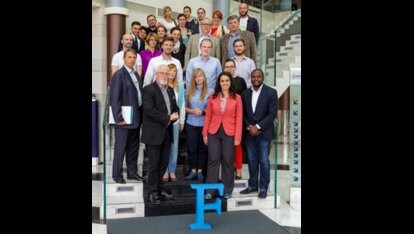
How could liberals best respond to the challenges of the refugee crisis? The three-tier-project financed by the European Liberal Forum (ELF) and supported by FNF followed the refugees on their path from Lesbos/Greece via Sofia/Bulgaria to Belgrade/Serbia. Around 20 participants from all across Europe had a chance to get a first-hand insight into refugee facilities, talk to state officials and civil society actors on the ground in Bulgaria. Watch the teaser video from the series of events in Bulgaria:
What if you became a refugee?
“A global response is needed to the refugee crises, resettlement is one of the good practices so far, but sometimes even small steps like cultural openness and linguistic understanding might be an easy, but highly needed solution”, summarized Shadi Martini, Syrian immigrant and Director of Orient Bulgaria Foundation during the Sofia part of the ELF Program. After a visit to Greece in May, on June 29th the second part of ELF workshop series took place in Sofia, Bulgaria, inviting different NGO’s and representatives of the government to present and discuss the current challenges of refugees to the participants in the ELF event.
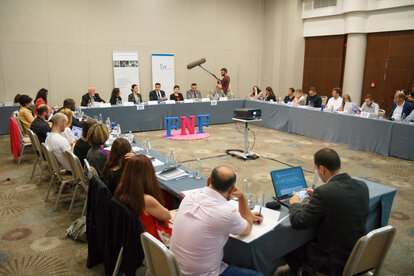
First Panel
After a warm welcome from the Vice-President of the European Liberal Forum, Dr Jürgen Martens, and from FNF Regional Director for East and Southeast Europe, Dr Rainer Adam , a panel discussion “The Obligation to Respect Human Rights “ with non-governmental experts described the challenges in Bulgaria and set the ground for further discussions. The legal experts on human rights, Ms Radostina Pavlova (Center for Legal Aid - Voice in Bulgaria )and Ms Denitsa Georgieva (Foundation to Access to Right, Bulgaria), gave an overview of the situation on the ground and elaborated on some of the legal problems that prevented refugees from entering Bulgaria from the Turkish border. It was pointed that there is a legal paradox that prevents people from entering from Turkey as they require a visa in order to pass the border legally.
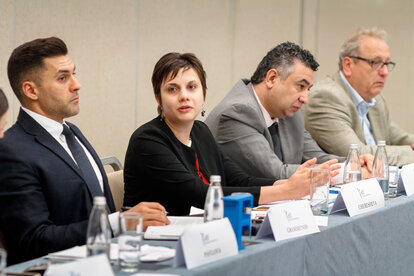
Investigative journalist Ms Mariya Cheresheva (BIRN’s correspondent and Vice-President of the Association of European Journalists - Bulgaria) shared that only a few journalists in Bulgaria report about the real situation objectively and thus, it is very difficult to debunk widespread myths in Bulgarian society about refugees. Ms Cheresheva, who has been for years volunteering to help refugees in Bulgaria, called for more journalist investigations in order to change the negative public perceptions and depict the reality.
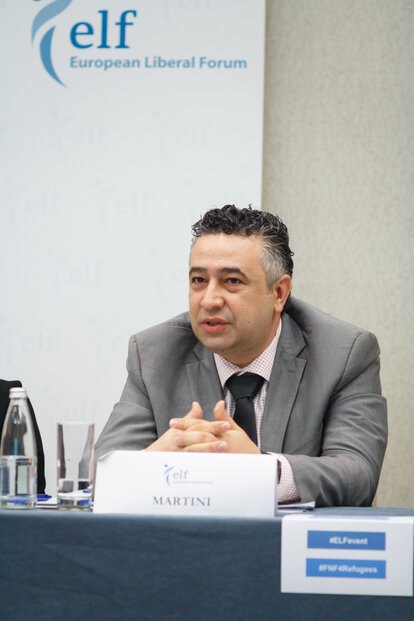
Shadi Martini
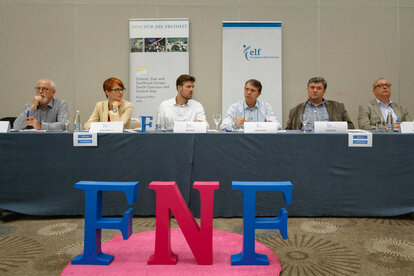
Second Round Table
The second round table described “The Situation in Bulgaria: Current Challenges and Limitations from the view of the authorities” with the following state institutions’ representatives: Kamelia Dimitrova (Acting Secretary General, National Commission for Combating Trafficking in Human Beings), Ivan Milanov (Head of the Department International relationships, State Agency for Refugees) and Yavor Siderov (Council of Ministers, Adviser to the Deputy Prime Minister for European Policies Coordination and Institutional Affairs, Bulgaria).
According to Mr Siderov, one of the main problems is the lack of integration of refugees due the interrelated factors. On the one hand, the reality on the ground is not communicated in an objective way, which easily gives leeway to the spread of xenophobia and nationalism. On the other hand, since integration is a two-way process, it is very important to respect as well the rights and concerns of the recipient societies.
Mr Milanov gave a detailed overview of the state capacity to deal with the influx of refugees, its evolution in the last few years and the current challenges ahead.
Mrs Dimitrova mentioned the great vulnerabilities of asylum seekers and refugees to human trafficking and other human rights violations. She explained that “despite the growing political attention to this risk, there is still no objective data, measuring these violations. Given the difficulties and lack of previous experience of the state officials in Bulgaria to deal with third country nationals, now the local authorities are undergoing different capacity-building trainings to better address these challenges.
For more photos from the discussions please see below:
Watch the video from the series of events in Bulgaria:
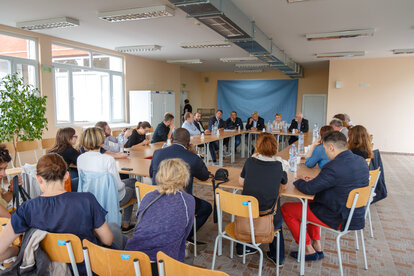
Voenna Rampa Visit
After the long day of discussions, the group visited “Voenna Rampa” Registration and Reception Centre in Sofia. The partly renewed former school building for sure is one of the better refugee facilities in Europe – but now it should just take in more of the people applying for asylum in Bulgaria. At that moment 352 people were accommodated there, out of whom the majority originates from Afghanistan. The field trip was a unique opportunity to discuss the challenges with the management of the asylum centre and to meet with refugees themselves.
On the next day the group headed towards Belgrade to visit refugee accommodation facilities there, speak with local NGO-s and experts, and make an overall reflection and summary of the three-tier-project. Find an article about the Belgrade visit here.
More Photos from Voenna Rampa, please find below: